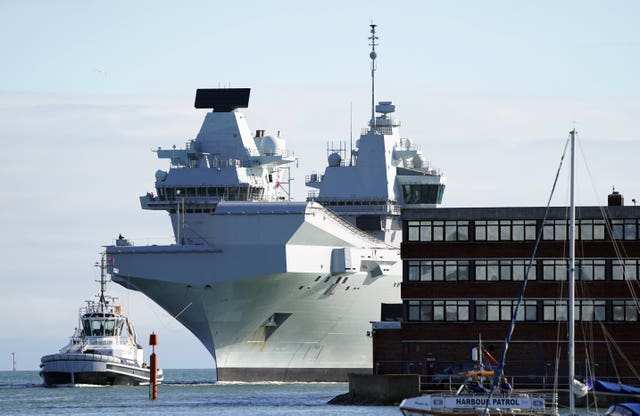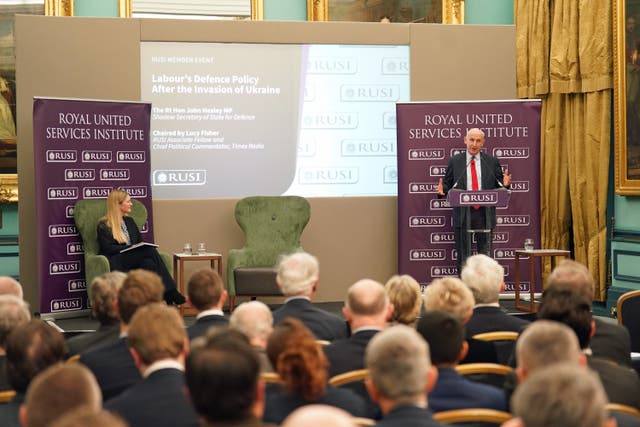The UK must show “realism” on its military commitments to the Indo-Pacific region, Labour’s defence chief has said, as he suggested a shift to focusing on Europe if Sir Keir Starmer wins power.
Shadow defence secretary John Healey, in a speech given in London on Tuesday, said it did not “make sense for UK forces to devote an increasing share of their scarce resources to the Indo-Pacific”.
Boris Johnson’s Integrated Review of Security, Defence, Development and Foreign Policy in 2021 announced a UK “tilt” towards the Indo-Pacific in recognition of China’s growing influence in the region.
It resulted in the UK’s aircraft carrier HMS Queen Elizabeth being deployed on a seven-month tour of the Indo-Pacific, while a new defence pact was signed with Australia, with the UK and US agreeing to provide Canberra with a nuclear-powered submarine as part of the Aukus deal.
But Mr Healey said there was a “Europe-shaped hole” in the UK’s security policy under the Conservatives and suggested a Labour government would shift attention back to “where the threats are greatest”, such as Europe and the Arctic.
The shadow cabinet member, speaking at the Institute of Directors, said: “Our Indo-Pacific military commitments need realism.
“British Armed Forces are ill-served by leaders pretending we can do everything, everywhere.
“Especially as, over the last 13 years, UK full time forces have been cut by over 45,000, one in five of the Navy’s surface ships have been scrapped and more than 200 RAF planes have been taken out of service.
“Just as we would not expect Japan or Australia to deploy much of their military to Europe, nor does it make sense – especially at this moment – for UK forces to devote an increasing share of their scarce resources to the Indo-Pacific.”
The senior Labour figure said his party — which is currently as many as 20 points ahead of the Conservatives in some national opinion polls — shared the concerns about “China’s growing military power and assertiveness” in the region.

But he said British support should come in the form of “technology, capability (and) diplomacy”, alongside the industrial defence co-operation seen in the Aukus agreement.
Mr Healey, reiterating a pledge made by shadow foreign secretary David Lammy in his Chatham House speech last month, said Labour would seek a defence and security pact with the European Union, including bespoke agreements with allies such as Germany.
The Opposition frontbencher said Russia’s invasion of Ukraine had shown that European military powerhouses would have to “take on more responsibility” for the continent’s security.
He added: “Britain’s security strategy must be ‘Nato first’.
“The first priority for Britain’s armed forces must be where the threats are greatest, not where the business opportunities lie.
“This is in the Nato area – Europe, the North Atlantic, Arctic. This is also our primary obligation to our closest allies.

“After Ukraine, European allies will have to take on more responsibility for European security.”
The speech, hosted by the Royal United Services Institute (Rusi) think tank, was made in the run-up to the March Budget and an update to the Integrated Review, which is also due to be published in the spring.
In a question and answer session afterwards, Mr Healey refused to say by how much a future Labour administration would increase defence spending.
Mr Healey said: “In principle, of course we’ll increase defence spending to meet the threats.
“But if you’re pushing me for a figure and to fix that ahead of the election, that cannot be done.”
On China, he told the audience that the Integrated Review labelling Beijing a “sound competitor” was “soundly based” and said it would be a “mistake” to designate the country as a “threat”.




Comments: Our rules
We want our comments to be a lively and valuable part of our community - a place where readers can debate and engage with the most important local issues. The ability to comment on our stories is a privilege, not a right, however, and that privilege may be withdrawn if it is abused or misused.
Please report any comments that break our rules.
Read the rules here